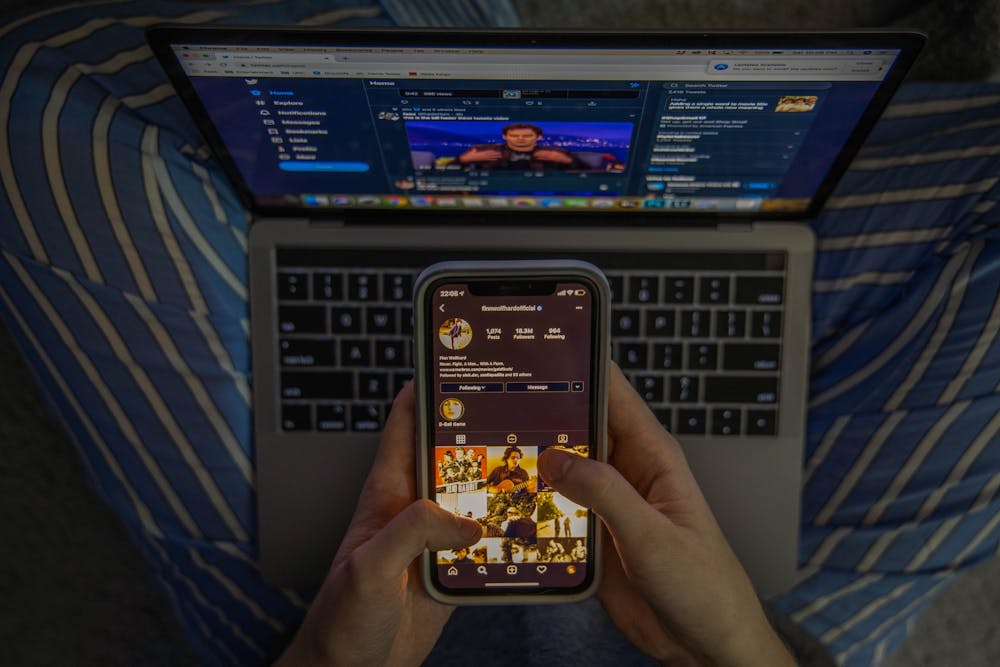“I was, I wouldn’t say obsessed, but I was over indulging in social media,” Lin said.
Lin said her involvement in social media was not only time-consuming but draining. Her academics, how she interacted with her family — all of these aspects of her daily life were impacted by social media.
Now, Lin said, she makes a conscious effort to cut back on app usage.
“I know it’s a distraction for me during my studies,” Lin said. “But it’s difficult to pull away from it, especially in a community and age where technology is so essential to communicating.”
What makes social media compelling is how efficiently it facilitates communication, Lin said. Now, a conversation with a family member or an old friend is just one call or post away.
But the very nature of social media apps like Instagram make them addictive, Lin said.
“Whenever I get caught up in Instagram and just keep scrolling, when I finally make myself stop, I feel so drained,” Lin said.
More problematic than the addictive nature of these apps is that social media encourages curation over authenticity, Lin said. As more and more people post curated content, users are encouraged to share only the best part of themselves, more and more.
At UNC especially, Lin said social media serves as an online community where students aim to put out a good image, for personal and professional reasons, as companies now review applicants' social media during the hiring process, she said.
For UNC senior Ashley Seace, this aspect of digital approval has turned into constantly comparing herself to others.
Seace said that at its best, social media allows her to stay in touch with friends from high school and celebrate their accomplishments. It also allows her to interact with like-minded individuals worldwide, making connections she might never have had otherwise.
But with increased interactions on social media, Seace said she compares herself to other people online.
To get the day's news and headlines in your inbox each morning, sign up for our email newsletters.
“You find yourself comparing yourself to other people or not posting anything bad, because want people to think your life is going perfect,” Seace said.
Public problems
Social media not only pervades daily life on a personal level, but has also entered the political sphere, with significant consequences.
In 2010, Twitter was relatively small. Now it serves as an important platform for political candidates to set their agenda, frame certain issues and drive conversation, Kreiss said.
Other social networking platforms like Facebook have become the main site for many political campaigns. During the 2012 election, Barack Obama’s campaign aimed on developing its own social media platform to base its campaign efforts, Kreiss said. But by 2016, Facebook proved the dominant platform for building a campaign base. Kreiss said that after that point, political candidates had to build their own social media presences on pre-existing platforms instead of curating their own from scratch.
Social media has also become a dominant platform for advertising, Kreiss said. Because of Google's acquisition of online advertising company DoubleClick and Facebook's development of their own ad platform, they now hold over 60 percent of the digital advertising market in the United States.
Kreiss said social media has made it easier than ever to understand candidate’s platforms, volunteer and fundraise — all fostering increased public participation in the political process. The nature of social media has made it possible for individuals to encounter political information in a multitude of ways.
Social media makes political information more readily available, but it also rewards extreme candidates, creating polarization. Even though party polarization predates social media, social media amplifies this divide, he said. When individuals share information in online communities, they often reward the most extremist rhetoric and punish the more moderate ideas, Kreiss said.
As social media has become ubiquitous, it has created a platform for sharing ideas and opinions on a broad scale. But some of the major pitfalls of this wide scope are the blurred lines between fact and fiction and the ease with which misinformation can be spread, Kreiss said.
“We have a broad sort of crisis in public trust that undermines basic foundations within which we can act in the world,” Kreiss said. “I think that’s the extreme consequence.”
In many aspects, Kreiss said, social media has introduced ways of sharing information that inherently bring both positives and negatives. The same systems that have allowed individuals to organize collective action have also facilitated communities spreading conspiracy theories, Kreiss said. Systems that allow individuals to live stream video of police brutality also facilitate mass shooters live streaming their acts of violence, he said.
“The worst of human nature is paired with, in some ways, the best of human nature,” Kreiss said. “And that’s why these things have been so attractable.”
@madelinellis
arts@dailytarheel.com




